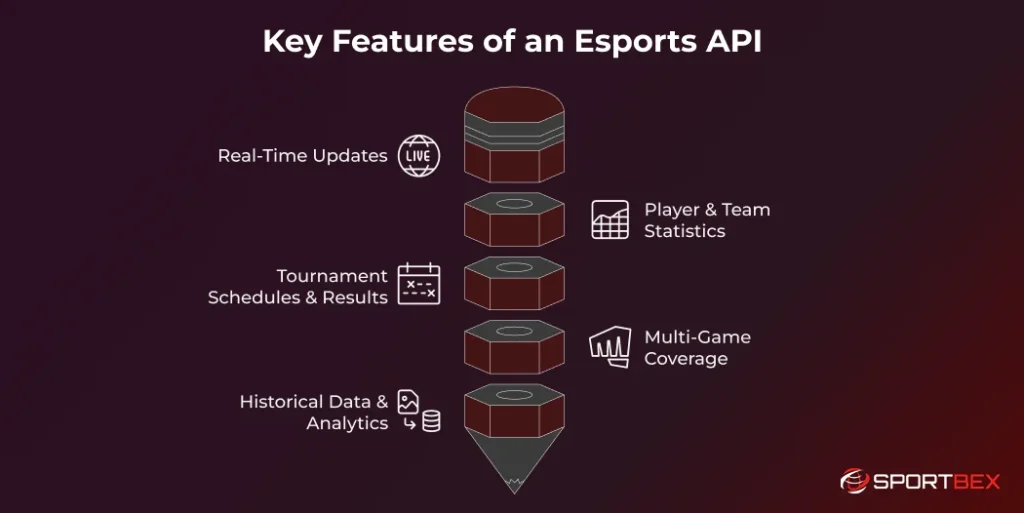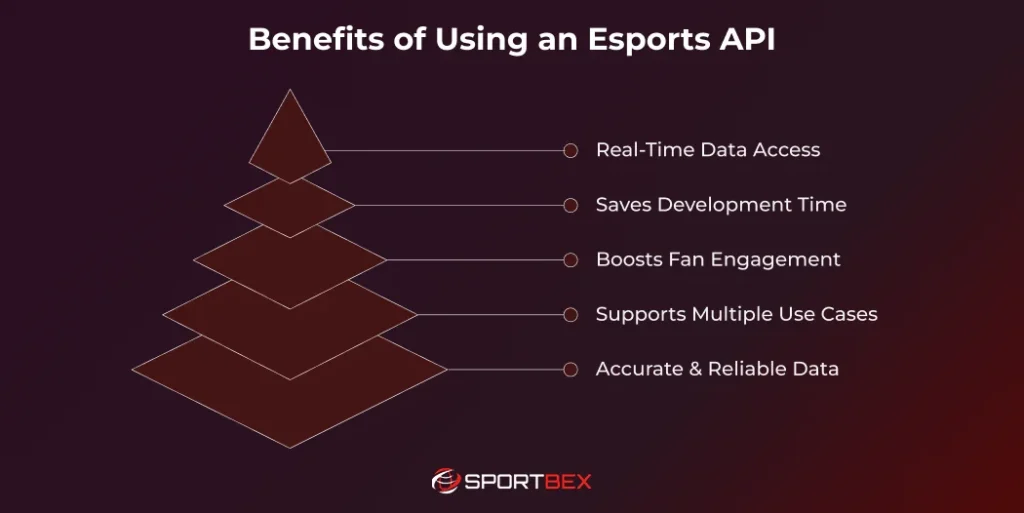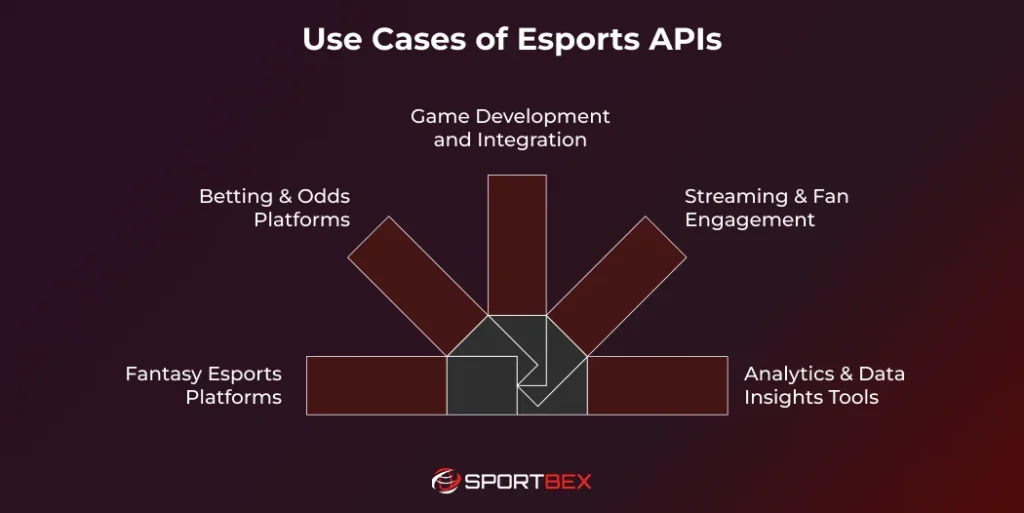The esports industry has evolved into a global multi billion dollar ecosystem. Millions of fans follow titles like League of Legends. Counter Strike. And Valorant across competitive tournaments. Structured data now powers every serious esports platform.
For every sports and esports content provider. Access to reliable data is essential for growth and scalability. A well structured Esports data API connects match statistics. Tournament schedules. And player insights directly into applications. Businesses can integrate an esports data API to deliver accurate updates.
What Is an Esports API? A Complete Guide for Beginners explores how modern platforms use api esports solutions to access real time match data. A professional Esports data API supports live tracking. Historical analytics. And structured event coverage. It simplifies complex data management for developers.
From live match updates to esports odds api integration. APIs improve operational efficiency for betting and analytics platforms. A live Esports API ensures accurate scores and event tracking. With the right strategy. Businesses can scale while delivering engaging esports experiences.
What Is an Esports API?
An esports API is a software solution that allows developers to access structured esports data and integrate it into their applications. When asking what is an Esports API, the answer is simple: it is a bridge between official data sources and your platform.
Instead of building independent data pipelines, developers rely on an Esports data API to fetch live scores, match statistics, tournament schedules, and historical performance data through secure endpoints. This allows platforms to scale efficiently while maintaining data accuracy.
Many modern platforms such as fantasy apps, analytics dashboards, and sportsbook esports odds API systems depend on reliable API esports infrastructure to operate efficiently.
How Does an Esports API Work?
Understanding how an esports API works helps businesses integrate it efficiently into their digital ecosystem. It ensures structured data flow. And supports scalable application performance.
- API Requests and Responses: Applications send structured requests to the API. The system processes these calls and returns formatted Esports data including match scores, player statistics, and tournament information.
- Endpoints for Data Access: Each endpoint provides specific datasets such as team performance, player profiles, or event schedules. Developers can easily access targeted information without retrieving unnecessary data.
- Real Time Data Delivery: A live Esports API continuously syncs with official data sources to update scores, odds, and match events instantly. This is essential for platforms offering live esports API for tournaments or betting services.
- Integration with Platforms: Using secure API keys, businesses can connect the API to websites, mobile apps, or dashboards. The integration process is streamlined to support scalability and performance across different products.
Key Features of an Esports API

Modern esports APIs are designed to support multiple business models across betting. Fantasy. And analytics platforms. They maintain strong data reliability. And consistent performance standards.
Real-Time Updates
A live Esports API delivers instant match updates and structured in game statistics. This ensures platforms receive accurate scores and event level data without delays. Real time processing improves platform responsiveness and user trust.
For betting and analytics systems. Real time accuracy is critical for performance and credibility. A professional Esports data API minimizes latency and ensures consistent synchronization with official data sources.
- Instant score updates across tournaments
- Real time player and team statistics
- Low latency data for esports betting api systems
Player & Team Statistics
Comprehensive player and team data form the core of any analytics driven esports platform. A powerful Esports data API delivers career statistics. Recent performance metrics. And roster updates in structured format.
For businesses analyzing the impact of analytics in esports. Detailed statistical breakdowns support predictive modeling and performance comparison. This data is essential for fantasy platforms and top esports betting sites.
- Career stats and recent performance metrics
- Head to head records and roster updates
- Advanced insights for esports betting api systems
Tournament Schedules & Results
An esports tournament API provides structured access to match schedules. Bracket progression. And league standings across competitions. This ensures platforms maintain accurate tournament coverage.
Beyond basic scheduling. APIs include prize pool information. Event formats. And streaming details for complete visibility. This is crucial for live esports API for tournament integration.
- Upcoming and completed match schedules
- Bracket updates and final results
- Detailed event and prize pool information
Multi-Game Coverage
Leading top esports API providers support multiple titles within a unified system. This reduces integration complexity and improves backend efficiency for growing platforms.
Unified api esports access allows businesses to manage data consistently across different games. Standardized formatting simplifies development and reduces operational risks.
- Multi title coverage in one framework
- Standardized data structure across games
- Simplified integration for scalable platforms
Historical Data & Analytics
Historical datasets strengthen analytical capabilities for esports platforms. An advanced Esports data API provides archived match data. Player progression records. And long term team performance trends.
Historical metrics also support esports odds api modeling and forecasting systems. This enhances strategic planning for sportsbooks and analytics tools.
- Archived tournament and match results
- Long term player and team performance data
- Data support for esports betting api modeling
Benefits of Using an Esports API

Using an Esports API allows platforms to access structured and real time match data without building complex backend systems. It improves operational efficiency. And ensures consistent data accuracy.
Fantasy Esports Platforms
Fantasy esports platforms rely on accurate player performance metrics and structured match data. An advanced Esports data API provides real time statistics. Historical performance records. And scoring inputs required to run competitive fantasy contests efficiently.
• Real time player statistics and match updates
• Historical performance data for scoring models
• Structured data support for fantasy league systems
Get Live Odds for Top Esports Titles
Use our reliable and fast API to create an engaging fan experience.
Betting & Odds Platforms
The esports betting api ecosystem requires precise and low latency data delivery. A powerful esports odds api enables platforms to calculate dynamic odds. Manage live markets. And settle wagers accurately across tournaments.Many top esports betting sites depend on reliable API esports infrastructure to ensure fairness and real time accuracy.
• Real time odds calculation and market updates
• Structured event tracking for in play betting
• Reliable data feeds for sportsbook esports odds API systems
Game Development and Integration
Game developers use API esports solutions to enhance competitive features within their platforms. Structured data integration supports leaderboards. Tournament brackets. And live performance dashboards across multiple titles.
• Leaderboard and ranking system integration
• Tournament bracket synchronization
• Competitive performance tracking tools
Streaming & Fan Engagement
Streaming platforms integrate live Esports API systems to display contextual statistics during broadcasts. Real time player insights and match analytics improve viewer engagement. And create more immersive esports experiences.
• Live statistical overlays during streams
• Player and team performance insights
• Interactive engagement features for audiences
Analytics & Data Insights Tools
Analytics platforms depend on structured datasets to evaluate trends and performance metrics. A comprehensive Esports data API provides historical match records. Team progression data. And advanced statistical inputs for modeling.
• Historical tournament and match analysis
• Performance trend evaluation tools
• Data support for predictive analytics systems
Use Cases of Esports APIs

Esports APIs enable a wide range of applications and business models across the gaming and entertainment industry. Understanding these use cases can inspire new product ideas and help you identify opportunities in the esports market.
Real-Time Data Access
The biggest advantage of using a live Esports API is immediate access to structured match information. Real time updates allow platforms to display accurate scores. Player stats. And in game events without delay. This is critical for competitive and data driven environments.
For esports betting api platforms. Latency directly affects user trust and operational fairness. Fast and consistent data delivery ensures proper odds calculation. Smooth user experience. And reliable event tracking across tournaments.
Saves Development Time
Building an internal esports data infrastructure requires significant technical investment and ongoing maintenance. By choosing to integrate an esports data API. Businesses remove the burden of manual data collection and complex system management. This reduces operational risk.
Developers can focus on feature development and platform innovation instead of backend maintenance. API esports solutions provide ready to use structured endpoints. Which accelerates product launch timelines and improves scalability.
Boosts Fan Engagement
Structured and detailed Esports data API integration enables interactive features such as live dashboards. Performance comparisons. And predictive engagement tools. This enhances user involvement during live tournaments.
Platforms powered by live Esports API systems can offer deeper insights and contextual statistics. Engaging data visualization increases session time. Strengthens retention. And builds long term user loyalty.
Supports Multiple Use Cases
An Esports API supports diverse business models including fantasy platforms. Streaming services. Analytics dashboards. And sportsbook esports odds API systems. A single integration can power multiple verticals efficiently.
This flexibility allows businesses to expand offerings without sourcing additional data providers. API esports architecture supports scalable growth. Cross platform functionality. And consistent data access.
Accurate & Reliable Data
Professional API providers maintain verified data sources and structured validation systems. This ensures high accuracy. Consistent formatting. And minimal downtime during major competitions. Reliable data is essential for user confidence.
For platforms operating esports betting api environments. Precision directly impacts credibility and financial integrity. A dependable Esports data API safeguards operational stability. And maintains competitive advantage.
Why Choose SportBex as Your Esports API Provider?
When selecting a reliable sports and esports content provider, data accuracy and infrastructure stability are critical. SportBex delivers structured and scalable API esports solutions across tournaments and multiple game titles.
Through well documented endpoints, businesses can access match schedules, player statistics, live scores, and esports odds api data. The platform supports seamless integration for websites, apps, and betting environments.
For operators searching among top esports API providers, SportBex combines performance reliability with long term scalability. Whether you operate a fantasy app, sportsbook, or analytics platform, this provider ensures consistent and structured data delivery.
Conclusion
As esports continues to expand globally. Structured data has become the foundation of modern digital platforms. Understanding what is an Esports API allows businesses to build scalable systems powered by accurate and real time information.
From esports tournament API integrations to advanced esports betting api solutions. APIs simplify development and reduce operational complexity. A well structured Esports data API improves accuracy. Performance. And long term platform stability.
For every sports and esports content provider. Reliable api esports infrastructure supports fan engagement. Odds management. And analytics driven decision making. This ensures platforms remain competitive in a rapidly evolving market.
Choosing a trusted provider such as SportBex strengthens data reliability and scalability. With a powerful live Esports API in place. Businesses can deliver seamless user experiences. And build sustainable growth in the esports ecosystem.
Your All-in-One Esports Data Feed
Deliver real-time scores, stats, and in-game events for top esports titles.
Frequently Asked Questions
An Esports API is used to provide real-time data such as match results, player stats, team performance, and tournament schedules. Developers use it to build apps, fantasy platforms, betting tools, and fan engagement dashboards.
An Esports API works by connecting your app or website to a data provider through endpoints. When you send a request, the API returns structured data like scores, statistics, or schedules in formats such as JSON or XML.
Yes. Many Esports APIs support multiple titles like League of Legends, Dota 2, CS: GO, and Valorant, giving you wide coverage for different fanbases and platforms.
When selecting an Esports API, focus on factors like real-time data delivery, wide game coverage, historical statistics, ease of integration, and reliable documentation. A strong provider also ensures scalability and consistent support for developers.
Integration usually involves signing up with a provider, getting an API key, and using their documentation to connect endpoints to your system. Most APIs come with developer guides and sample codes to make setup easier.
Recent Blog
Why Use a Soccer Betting API for Sportsbook Development
March 3, 2026
How Accurate Are Live Odds on Horse Racing Online Bookmakers?
March 2, 2026




